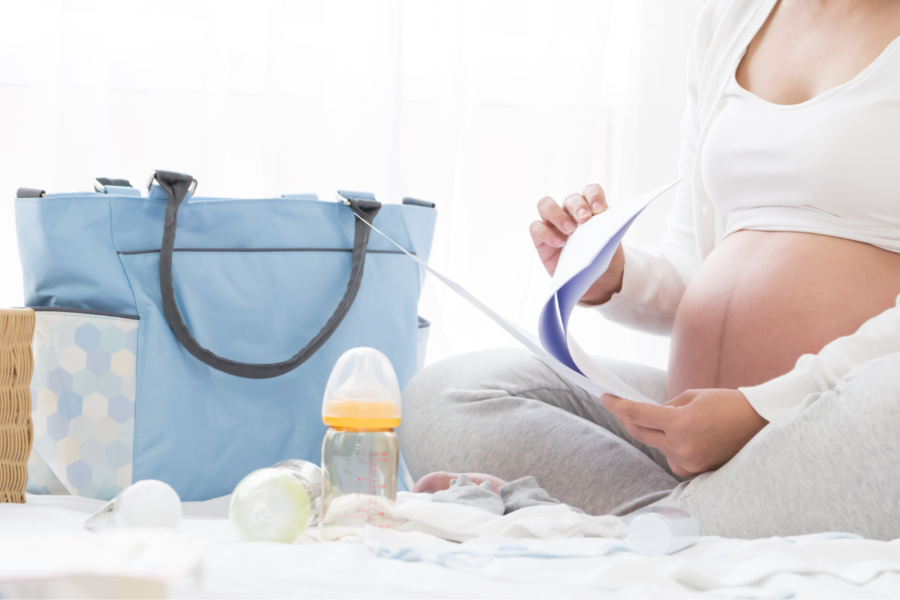The third trimester starts around week 28 and lasts until about week 40. It is a key stage of pregnancy. Expectant mothers go through big physical and emotional changes. They get ready for the arrival of their baby.
The baby grows to about 19 to 21 inches and weighs 6 to 9 pounds by the end. Mothers often feel excited and worried at the same time.
During this time, getting good prenatal care is vital. You might see your doctor more often, every two weeks after week 32. As you get closer to your due date, visits become weekly. Health care providers check your baby’s growth and your health too.
Getting ready for labour is also key. Talk about your birth plan. Learn about Braxton Hicks contractions and body changes. This knowledge makes you feel empowered. It helps you look forward to becoming a mother with joy, not fear.
Key Takeaways
- The third trimester lasts from week 28 until birth, with frequent physical and emotional changes.
- Regular prenatal visits are crucial, occurring every two weeks, and weekly in the final month.
- Expectant mothers may experience heartburn and should consider dietary adjustments for comfort.
- Routine screenings for conditions like gestational diabetes are vital for maternal and fetal health.
- Vaccination with the Tdap vaccine during the third trimester offers protection against whooping cough.
Understanding the Third Trimester
The last stage of pregnancy, the third trimester, is from week 28 to delivery. It brings big changes to a woman’s body and emotions as she gets ready to meet her baby.
Physical Changes During the Third Trimester
As the baby grows, the mother’s body changes too. Some common symptoms include shortness of breath, more frequent urination, and heartburn. Women might also see swelling in their ankles, get varicose veins, and struggle with sleeping. Not to forget, Braxton Hicks contractions might start happening.
During weeks 29 to 34, the baby loses its fine hair, called lanugo, and its skin turns pinker. By the final weeks, the lanugo is gone, and the baby gains more than half of its total weight. It usually weighs over 2.8 kg at birth. This time also calls for more doctor visits to ensure both mum and baby are healthy.
Emotional Adjustments in the Third Trimester
Emotional ups and downs are common in the third trimester. Women feel excited, worried about childbirth, and tired from pregnancy. Many also feel a strong urge to get everything ready for the baby’s arrival.
It’s important to know labour can start as early as week 37. Signs to watch for include tight feelings in the abdomen and changes in water or fetal movement. If worrying symptoms like bleeding or signs of early labour show up, getting medical help right away is essential. This is a crucial time for the health of both the mum and her baby.
Essential Preparations for a Successful Third Trimester

The third trimester is vital in pregnancy, bringing changes and more duties. Getting ready now can make things easier, helping both mum and baby. It’s important to have a Birth Plan and follow the Nesting Instinct to get your home ready.
Create Your Birth Plan
A Birth Plan is key for soon-to-be mums. It’s a guide that states how you’d like your labour and birth to go. It covers choices like:
- Where you want to give birth.
- How you manage pain, with drugs like epidurals or natural ways.
- What happens after the baby is born.
Talking about your Birth Plan with your doctors helps them understand what you want. This is especially good to do when you see them in the third trimester. It’s a chance to adjust your plan as needed.
Nesting Instinct and Baby Preparations
Many mums feel a strong urge to get their homes ready in the third trimester. This Nesting Instinct is all about preparing for your baby. Think about doing things like:
- Setting up a nursery or a place for the baby to sleep.
- Buying things the baby will need, like clothes and nappies.
- Checking your home is safe for a baby.
Now is also a good time to learn infant CPR and first aid, if you haven’t already. Knowing these skills gives you confidence to handle emergencies. A tidy, prepared home and knowing what to expect in labour can make becoming a parent less daunting and more joyful.
Monitoring Your Health and Wellbeing

Keeping an eye on your health in the third trimester is key for both mum and baby. You’ll start with antenatal appointments every four weeks until the 36th week. Then, visits become more frequent. At these check-ups, they’ll look at your blood pressure, track your weight, and test for things like diabetes and Group B strep. Finding problems early can really help.
About one in five people feel anxious or depressed in the third trimester. It’s important to look after your mental health as well as your physical health during this time. Your doctor should check for signs of depression, and you should tell them if you’re feeling worried. The added pressure from the baby might make you feel uncomfortable, with common issues like heartburn and shortness of breath.
If your baby isn’t in the right position for birth, knowing your options can ease your mind. Expect to gain about 11 to 16 kg during pregnancy. The average baby weighs around 3.4 kg by week 40. This knowledge helps set realistic goals for getting back in shape after the baby comes.
- Regular health checks catch problems early, like preeclampsia, especially in high-risk pregnancies.
- Talks on how to get ready for breastfeeding and looking after yourself post-birth are crucial.
- Good nutrition and lifestyle choices remain important for your health.
As the due date gets closer, it’s vital to watch for any new signs or symptoms. A proper health and prenatal care plan sets the stage for a safe birth. It also helps you adjust to motherhood more smoothly.
Conclusion
As your pregnancy reaches its final stages, it’s key to fully understand what’s coming. The last few months are all about changes in your body and feelings. By following Third Trimester Tips—like recognizing your changing body and mind, making a detailed birth plan, and getting your home ready—you’ll feel more prepared. It’s very important to take care of yourself during this vital time.
Getting ready for childbirth means knowing what symptoms might show up. This includes swelling, leg cramps, and needing to wee more often. Regular doctor visits are important, but so is looking after your well-being. This helps make a safe and loving space for you and your baby. A mum who’s ready and supported helps make the birth experience better.
The last trimester is a mix of waiting and adjusting. Understanding what your body needs and keeping healthy can reduce stress and make things better. As the time to meet your baby gets closer, knowing how to get ready for labour is helpful. With your loved ones and medical team’s help, you’re set for an amazing journey into motherhood.




